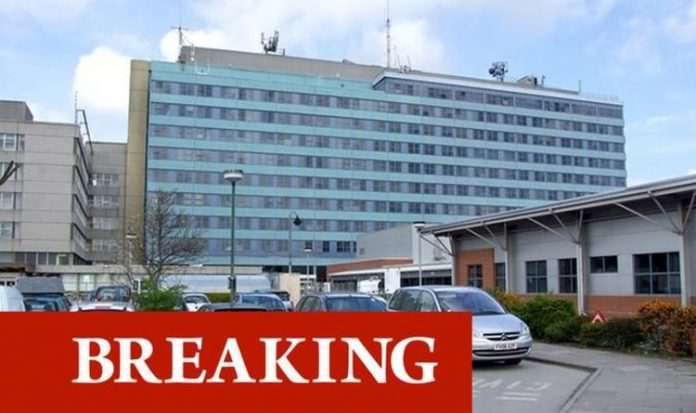NHS chief discusses reality of coronavirus hospital patient figures
United Lincolnshire Hospitals NHS Trust has warned that more Covid patients are now being treated than in the first wave last year, with intensive care units remaining “extremely busy”. Mark Brassington, Deputy Chief Executive at ULHT, said: “We are sorry for the waits that our patients have faced yesterday and overnight. “The number of inpatients who have been confirmed as having COVID-19 across our sites remains higher than in wave one and we remain extremely busy across our wards and intensive care units.”
The Trust is made up of County Hospital Louth, Pilgrim Hospital Boston, Grantham and District Hospital and Lincoln County Hospital.
However, patients using this service are being asked to still attend appointments unless they are contacted directly.
The Trust added visiting at all of ULHT’s hospitals is suspended.
Last week, Essex declared a major incident as frontline workers in hospitals across the county were revealed to be facing tremendous pressure.

Covid emergency declared in Lincolnshire (Image: GETTY)
Sir Bernard Jenkin, MP for Harwich and North Essex, publicly asked Heath Secretary Mat Hancock at the time: “I can confirm that Essex has declared a major incident and can I also inform [Hancock] that at this very moment they are submitting a request for military assistance to the civil authority, a MACA request to assist with the construction of community hospitals, additional hospital capacity and supported by the armed forces and party staffed by the armed forces.
“They would also like armed forces help with the roll-out of the vaccine to accelerate that in Essex and to assist with testing in schools.”
Professor Neil Mortensen, president of the Royal College of Surgeons, warned today that there will not be capacity in hospitals to treat other illnesses without reducing transmission of the virus.
He told Times Radio: “There needs to be space in our hospitals for us to deal with all the other things – the heart attacks or strokes, the cancer surgeries and emergency surgery.
“We have to be able to keep capacity to do those. And if we don’t reduce the transmission of the virus, there won’t be that capacity.”
When asked whether the NHS will be able to return to normal business by late spring, he added: “I’m afraid I’m one of the pessimists I think this is going to drag on a bit.
“I think that we’re really not going to be any bit in any better shape (until) summer I’m afraid.
“I think it’s going to take a long time. This is a very, very, very serious situation.
“There’ll be an enormous backlog of elective surgeries, and we may have backlogs of some more urgent surgeries to get through as well so it’s going to be a long tough, hard winter and spring.”
It comes as a further 582 people who tested positive for coronavirus have died in hospital in England, bringing the total number of confirmed deaths reported in hospitals to 52,395, NHS England said today.
Patients were aged between 29 and 103. All except 25, aged between 56 and 101, had known underlying health conditions.
The deaths were between November 5 and January 4, with the majority being on or after January 1.
There were 20 other deaths reported with no positive Covid-19 test result.
Prime Minister Boris Johnson announced the new lockdown late on Monday, saying the highly contagious new coronavirus variant first identified in Britain was spreading so fast the National Health Service (NHS) risked being overwhelmed within 21 days.
In England alone, some 27,000 people are in hospital with COVID, 40% more than during the first peak in April, with infection numbers still expected to rise further after increased socialising during the Christmas period.
A Savanta-ComRes poll taken just after Johnson’s address suggested four in five adults in England supported the lockdown.
“I definitely think it was the right decision to make. The NHS hospitals are really full so we’re in a similar position as we were in lockdown number one,” said Londoner Kaitlin Colucci, 28.
“I just hope that everyone doesn’t struggle too much with having to be indoors again.”
Since the start of the pandemic, more than 75,000 people have died in the United Kingdom within 28 days of testing positive for coronavirus, according to official figures.
Under the new rules in England, schools are closed to most pupils, people should work from home if possible, and all hospitality and non-essential shops are closed.







